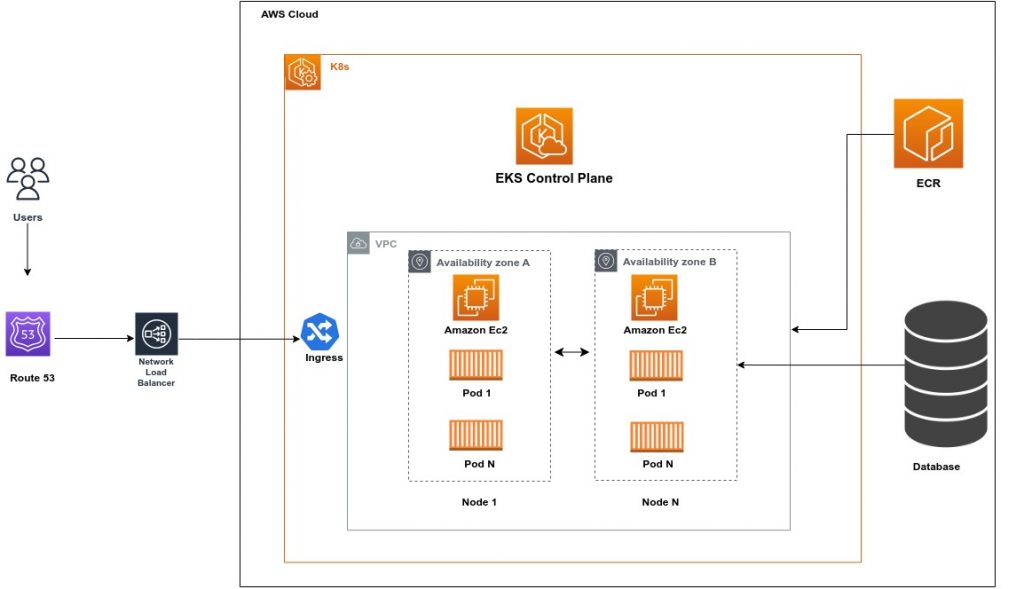In the modern era of rapid technological advancements, businesses are consistently looking for methods to boost their scalability, efficiency, and overall performance.
One of the most effective solutions to achieve these goals is through containerization, which allows for the seamless deployment and management of applications across various environments. Amazon Elastic Kubernetes Service (EKS) stands out as a powerful platform that harnesses the potential of containerization, enabling organizations to achieve greater agility, scalability, and reliability. In this blog, I will take you through the key features, benefits, and use cases of Amazon EKS, demonstrating how it can revolutionize your business operations.
But first, let’s take a look at the architectural overview of the Elastic Kubernetes Cluster.
Architectural Overview Of Elastic Kubernetes Cluster:

Key Features and Benefits Of Amazon EKS
1. Simplified Container Orchestration with Kubernetes
Amazon EKS leverages the popular open-source container orchestration tool, Kubernetes, to simplify the management of containers. Kubernetes provides a robust framework for deploying, scaling, and managing containerized applications across clusters of servers. EKS takes care of the underlying infrastructure, automating the provisioning, scaling, and monitoring processes, allowing businesses to focus on application development and innovation.
Use Case
Retail companies can leverage Amazon EKS to effortlessly deploy and manage microservices-based applications. With EKS handling the orchestration, developers can focus on building and updating individual services, ensuring smooth scalability and improved performance.
2. High Availability and Scalability
EKS offers a highly available and scalable environment for running containerized applications. It automatically distributes containers across multiple Availability Zones, ensuring high resilience and fault tolerance. Furthermore, EKS scales seamlessly based on the demand, allowing applications to handle spikes in traffic without any disruptions.
Use Case
Popular e-commerce platforms can utilize Amazon EKS to handle surges in customer traffic during seasonal sales or promotional events. With EKS’s automatic scaling capabilities, the platform can seamlessly accommodate increased user activity, ensuring a smooth and uninterrupted shopping experience.
3. Integrated Security and Compliance
Security is of paramount importance when it comes to deploying applications. EKS provides a robust security model, integrating with other AWS services to enforce secure access and data protection. It allows granular access control through AWS Identity and Access Management (IAM) roles, ensures encryption of data in transit and at rest, and enables integration with AWS Key Management Service (KMS) for secure key management.
Use Case
Healthcare organizations can leverage Amazon EKS to deploy healthcare applications that handle sensitive patient data. EKS’s built-in security features, combined with encryption capabilities, provide a secure and compliant environment for storing and processing sensitive information.
4. Global Availability and Multi-Region Support
Amazon EKS is available in multiple AWS regions worldwide, thus allowing businesses to deploy their applications closer to their users for reduced latency and improved performance. EKS also provides multi-region support, enabling organizations to build highly available and fault-tolerant architectures that can withstand regional failures.
Use Case
Global e-commerce companies can leverage Amazon EKS to deploy its application across multiple regions, ensuring fast and reliable access for customers worldwide. With multi-region support, the company can maintain high availability, even in the event of a regional outage.
5. Enhanced Developer Productivity
EKS simplifies the development and deployment process, enabling developers to focus on writing code and delivering features rather than managing infrastructure. The platform offers seamless integration with popular developer tools, such as AWS CodePipeline, AWS CodeBuild, and AWS CodeDeploy, facilitating continuous integration and deployment (CI/CD) workflows.
Use Case
Software development companies can utilize Amazon EKS to streamline their CI/CD pipelines. By integrating EKS with CodePipeline, CodeBuild, and CodeDeploy, the company can automate the build, test, and deployment processes, reducing manual effort and accelerating time to market.
6. Cost Optimization with Autoscaling
EKS provides built-in auto scaling capabilities that allow businesses to optimize their costs based on application demand. By automatically scaling the number of containers in response to workload changes, EKS ensures that resources are efficiently utilized. This eliminates the need for manual scaling, reduces infrastructure costs, and ensures optimal performance.
Use Case
Media streaming platforms can leverage Amazon EKS to automatically scale the number of containers based on viewership demand. During peak usage periods, EKS can dynamically add containers to handle the increased load, ensuring a seamless streaming experience for users while minimizing infrastructure costs during periods of low demand.
7. Seamless Integration with AWS Services
Amazon EKS seamlessly integrates with other AWS services and enables businesses to leverage the full suite of AWS offerings. This integration allows organizations to take advantage of services like AWS Identity and Access Management (IAM), Amazon Virtual Private Cloud (VPC), Amazon Relational Database Service (RDS), and Amazon S3, among others. This ecosystem of services provides a comprehensive and unified platform for building and running applications.
Use Case
E-learning platforms can utilize Amazon EKS to deploy its application while integrating with AWS services, such as Amazon S3 for content storage and Amazon RDS for database management. This integration simplifies the development and deployment process, allowing the platform to focus on delivering high-quality educational content.
8. Advanced Networking Capabilities
Amazon EKS provides advanced networking capabilities, allowing businesses to configure and manage their network infrastructure with ease. EKS integrates with Amazon VPC, enabling organizations to create isolated and secure network environments for their containerized applications. Additionally, EKS supports Kubernetes Network Policies, giving businesses granular control over network traffic between pods and enhancing security and isolation.
Use Case
Financial services companies can leverage Amazon EKS to deploy applications that handle sensitive financial data. By utilizing the advanced networking capabilities of EKS, the company can ensure that only authorized pods have access to specific resources, creating a secure and compliant environment.
Final Thoughts
Amazon EKS presents a compelling solution for organizations seeking to harness the benefits of containerization. By providing simplified container orchestration, high availability, integrated security, streamlined monitoring capabilities, and much more, EKS empowers businesses to drive innovation, enhance scalability, and ensure reliability in their application deployments. With seamless integration with AWS services, cost optimization with autoscaling, and the flexibility to run applications anywhere, EKS enables organizations to accelerate their digital transformation journey and stay ahead in today’s competitive landscape.
About the author

Sathyanaraynan B is a DevOps Engineer at Siam Computing. Deeply passionate about technology and its impact on businesses, he is fascinated by the possibilities cloud computing offers and how it can transform the way organizations operate. He takes a keen personal and professional interest in exploring the intricacies of Amazon EKS and sharing his knowledge of the platform to enable businesses to improve their efficiency and scale.








